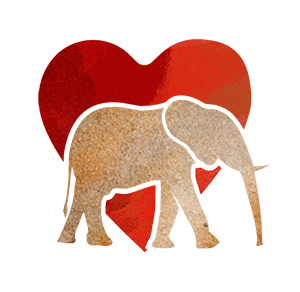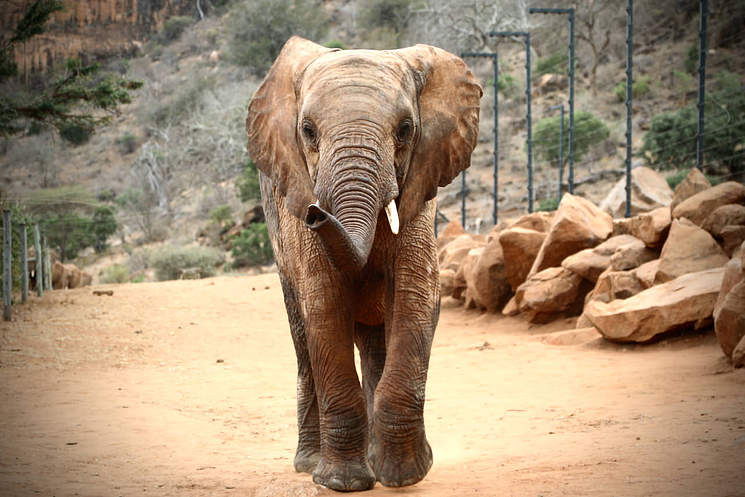On the very peak of the Ndoto Mountains, in Kenya’s remote Northern Frontier District, a tiny newborn baby elephant was found confused, alone and scared in a throng of sheep and goats. This little calf had evidently become mixed up in the nomadic Samburu tribesmen’s livestock soon after he was born. It is probably that the human presence is what frightened his mother leaving the abandoned calf mixed up in the livestock. The traditional Samburu pastoralists here live in an extremely isolated and inaccessible area of Kenya, a beautiful and majestic landscape. Despite many of the Samburu people being sympathetic and use to living this life of coexistence between man, their livestock and the wild animals, sometimes human wildlife conflict can unintentionally create these kinds of tragedies.
This tiny baby was born that day as the Samburu herdsmen came across the fetal matter. The elephants had by this time scattered and were nowhere to be seen when the shocked tribesmen found a baby elephant amidst his flock. They guided the baby back to the safety of their Samburu ‘boma’ (homestead) on the evening of Tuesday 5th August. The calf’s umbilical cord was still fresh, his ears still pink and his weak legs still learning how to walk, yet without his mother to guide him he merely followed what he thought was his family, too young to know any different.
This elephant herd is one of a few, which have slowly begun to migrate back to the peaks of the Ndoto Mountains where they once roamed in high numbers over thirty years ago, having returned to find a safe and plentiful environment. The Samburu community, which is once again learning to live with elephants having not seen them in so long, made every effort to return the calf to its mother. This was not successful.
As darkness closed in the community was hesitant and afraid of the little calf, but they let him stay close to their cattle for company during the night. Regrettably, yet out of care alone, the following morning the family whose livestock the calf had followed saw how desperately hungry the little baby was and mixed him some local porridge called ‘uji’ containing maize flour, fat and cow’s milk. Here at the David Sheldrick Wildlife Trust and to those well-informed it is known how deadly cow’s milk can be for a young elephant calf, yet this community only thought they were doing what was best.
Due to the true isolation of this beautiful mountain range the Samburu have no access to any form of communication, transport, roads or even electricity but they knew they had to get this baby help, and quickly. That morning one of the community members took on the task of hurrying down the mountainside for help and to seek out a community ranger based in the foothills of the mountain working for a grassroots conservation organization called the Milgis Trust headed by Helen Douglas-Dufresne. This is no short journey by foot, and certainly not an easy one without proper tracks or roads, yet the Milgis Trust ranger was found by midday after many hours of walking so determined the community was to help save this elephant’s life.
Equipped with a handheld radio the ranger immediately reported the incident to Helen. Helen, having rescued several elephant calves before, made a call to the The David Sheldrick Wildlife Trust headquarters without delay, but realizing that the hour was too late for a rescue that day everything was planned for the next day. The ranger was then tasked with hurrying back up the mountain with the community messenger to collect GPS coordinates of the baby’s location to help with the rescue and continue to care for the calf with instructions from the David Sheldrick Wildlife Trust.
The ranger, who literally ran up the mountain to the area known as Suruan where the baby was still located, immediately took the calf into his care, bringing him inside the safety and warmth of the boma, covering him in blankets and making sure he was fed on nothing else other than rehydration salts until he could get the special milk formula needed for his survival the following day.
In the early evening hours of Wednesday 6th a plan was made for a helicopter rescue at sunrise, the only means possible to get to the baby elephant. Communications continued through the night to ensure the rescue would go as smoothly as possible in order to get the calf to the Nairobi Nursery safely and quickly for the care, milk and medication he so desperately needed. The helicopter was chartered from Tropic Air.
At 6.45am on Thursday 7th having received an early morning report to confirm the rescue mission must still go ahead, the helicopter crew was airborne and began their journey north to the Ndoto Mountains following the GPS coordinates. Traveling over the northern frontier the mighty Ndotos soon loomed large and the helicopter pilot found his landing site in a suitable clearing, touching down at just after 8am close to the boma where the tiny baby was sheltered.
The rescue team were astonished at the size of the tiny newborn calf as he slowly emerged from the hut following those who had cared for him so nobly. He was led to the helicopter and then prepared and secured for the flight and the tiny blanketed bundle loaded onto the back seat.
Meanwhile at the Nursery the David Sheldrick Wildlife Trust Keepers were all preparing for the baby’s arrival.
Delayed slightly by poor weather conditions, the helicopter arrived at the Nursery by 10am, sending clouds of dust into the air as it landed smoothly at the mud bath area. As soon as the engine had stilled the doors were opened and the Keepers laid eyes on a little red bundle, a bundle that couldn’t weigh more than 40kgs. Carrying the calf easily in their outstretched arms across the mud bath area he was laid in blankets in one of the warm stables and unwrapped. What was revealed was the smallest elephant ever to come into our care. It was thought this tiny baby must have been premature he was so small. He was immediately fed a fresh mixture of milk formula, which he hungrily accepted, before being put on a life saving drip.
We called the new arrival Ndotto, after the Ndoto Mountains, which in Swahili means to dream. As a newborn Ndotto’s journey was challenging and fraught from the beginning, and it took three and a half months before he began to teeth confirming that he was certainly born premature by a couple of months. It is for this reason that we have delayed placing Ndotto onto the fostering program, frightened to jinx the miracle. He is through his teething with four molars out, remains tinier than any of the new born babies coming into our care despite being five months old now, yet he has a huge personality.



































































